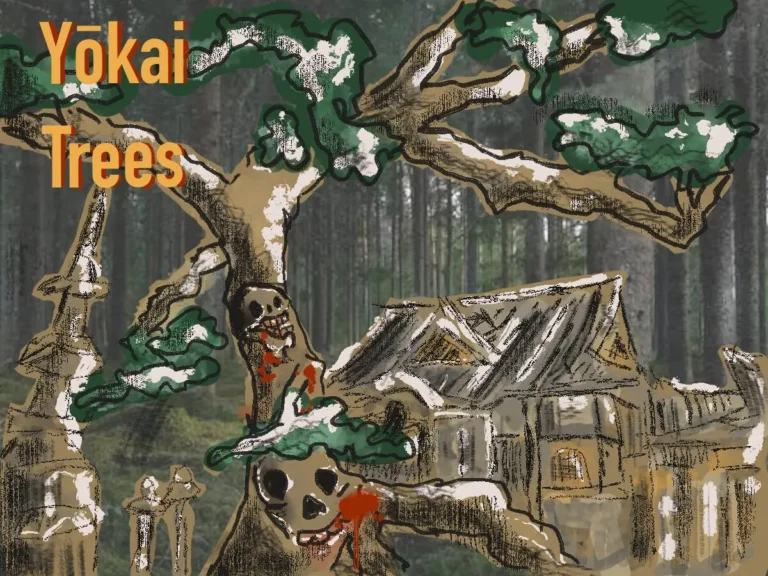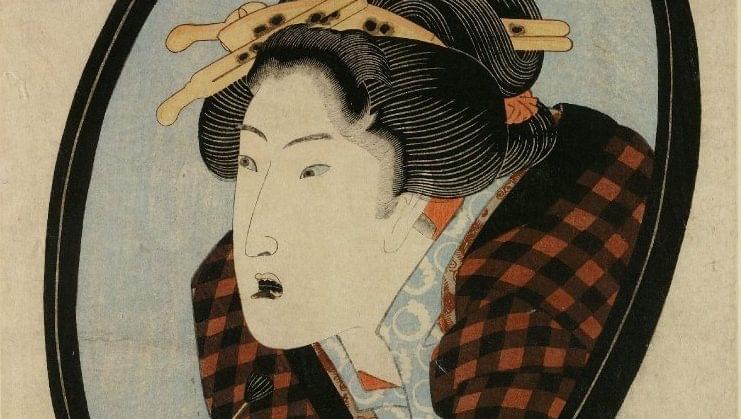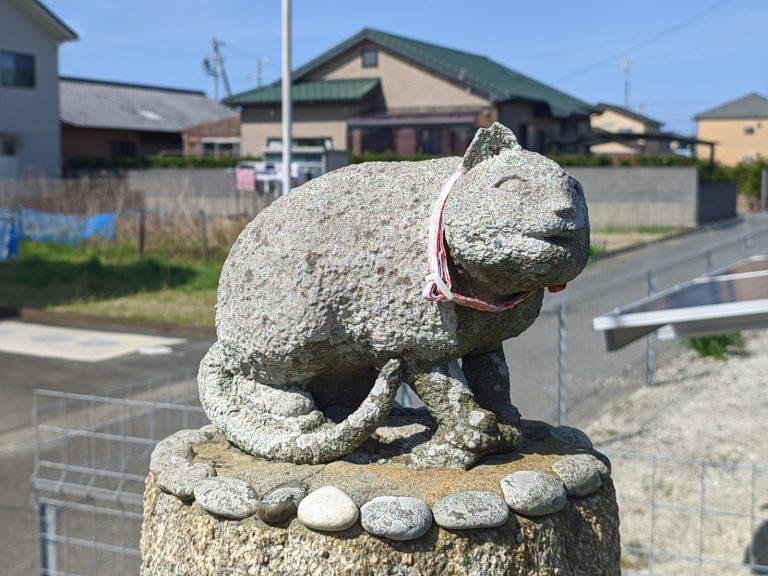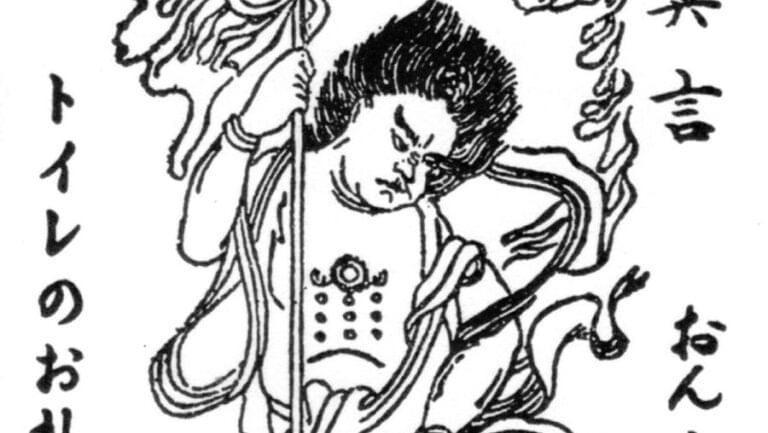Intro (phone and music?)
Moshi moshi. This is Thersa and I’m calling to let you know you’re listening to Uncanny Japan. The podcast about mysterious yōkai, fascinating folktales, and endearing superstitions.
I was thinking to myself, I can’t remember the last time I delved into an interesting aspect of the Japanese language. So, today I’m going to change that by exploring two seemingly innocuous and completely unrelated words that actually have very intriguing and eerie origins. One of these I’ve known about for a long time and have always wanted to talk about, while the other I stumbled upon just the other day. They aren’t connected, but that’s never stopped me before. Let’s see what I can do.
(end intro— hang up phone)
Words for Twilight
The first is the word that is new for me. It means twilight. Now there are a bunch of words for twilight or dusk that I did know about: Yūgata ( 夕方), Evening or night direction; Higure (日暮), something like the end of the day or the end of the sun; nichibotsu (日没), Sun sinking or day submerging; Tasogare (黄昏), yellow twilight or darkness; and yūyami (夕闇) evening darkness or gloom.
Omagatoki: Meeting Demons
Those are all fine and good and evoke their own unique sense of beauty and melancholy. But how did I ever miss, ōmagatoki (逢魔時)? Ou means to meet. Ma is the character you find in mahō (magic or sorcery), majo (witch), and mamono (monster or evil spirit). It’s associated with supernatural or ominous things. So a witchy, magical, evil spirit or demon vibe.
And, of course, toki is time or period. Oumagatoki. The time or hour when one encounters evil spirits or otherworldly events. There’s even another way of writing ōmagatoki which isn’t a whole lot better. It literally translates as: the hour of big calamity (大禍時). Despite the beauty, not too long ago, it wasn’t a very auspicious time.
So you have to imagine before street lights and city lights. When after the sun sets the sky fades from orange to red to purple, then deep blue before everything goes completely black. It was there in that liminal space (before total darkness) between day and night, that the boundary that separates the human world and the supernatural realm becomes thin. It’s in this spooky transitional period that you are more likely to bump into ghosts, yōkai, or other creepy phenomena. A time when monsters begin to stir and cause misfortune.
It makes sense. How often do you find yourself out during this time? Even before I learned the new word, I have been purposely going out during this omagatoki for a few months now. Not to run into anything scary, but because while the first deal fell through, the land behind my house is once again being sold and a new neighborhood is going to be built at the end of this year, beginning of next. So I really want to enjoy all those sunsets over the rice fields filled with summer frogs while I can.
It’s not just the slow changing cloud colors from orange to indigo either, but the air itself seems to shift. I find this is the behavior of my crow friends who act more nervously, on alert for other crows who might be flying too close. But then finally settling down and calling out to the family that it’s time to come home so they can roost in the pine trees at the shrine near my house.
If there are any blue egrets in the fields or flying overhead they make this incredibly pained squawking as they, too, return home. All the jittery little bats wake up though and come out to dart around snapping up bugs. And I find my own vision starting to play tricks on me as the light fades and I try to focus on what’s around me.
Don’t Got to Temples or Shrines at Dusk
I read one place in Japanese, that it is during the omagatoki time that evil spirits like to take advantage of a weakened heart. It went on to say that it is recommended never to visit a temple or shrine during this time. Always go earlier in the day. Not only is it the interval to meet up with bad preternatural things, you have to remember most people visit because they have some prayer or wish. Many times they are having some unlucky or difficult experience they want to get rid of or get help with. That negative energy has been left there and settles. Going to a temple or shrine at dusk means you might just stir it up, and you risk it sticking to you.
Toriyama Sekien’s Version
Remember Toriyama Sekien? The artist and storyteller I’m always going on about? You’ll also remember in his books each chapter is a different yōkai, or ghost, or creature. But even he dedicated one chapter to this time of day. It’s in his book “Konjaku Gazu Zoku Hyakki,”
In Hiroko Yoda and Matt Alt’s incredible translation called Japandemonium — which I encourage anyone who is deeply into yokai lore to pick up —, this entry is translated as “The Hour of Meeting Demons. The time when uncounted phantoms appear and the common folk avoid letting their children go outside.”
What’s interesting is that Sekien references a point in Chinese history (9 BCE) when Wang Mang took power and there was great unrest in the country. Two years later, the Yellow River decided to change direction and there were terrible flood. Ol’ Wang Mang did nothing to help all the affected people. The refugees and survivors formed rebel armies, marched in and chopped off Wang Mang’s head. It was a time of great calamity as one might say.
Sekien’s image is that of a city, a flock of crows in the sky and the clouds above forming themselves into various dragons and beasts.
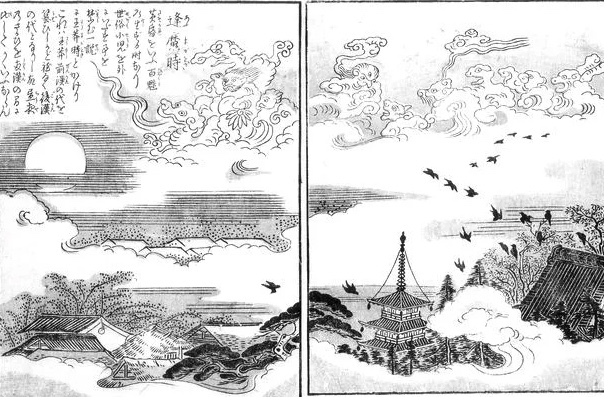
You can find a modern version of this concept in the manga by Kazuhiro Fujita called The Twilight Zoo in English. Here the title doesn’t do justice to the Japanese which is Omagatoki Dobutsuen. Knowing now what you know about that word for twilight gives it a nice chilling nuance that twilight just doesn’t evoke.
Moshi Moshi
Now for that second word or words that everyone uses without much thought. When you answer a phone in Japan what do you say? Right! Moshi moshi. Isn’t it cute? I remember my friends and family calling me at the dorm back in university and getting such a kick when I answered. Moshi Moshi.
Did you know you can also use moshi moshi to try and get someone’s attention? Especially if they seem to be distracted or unresponsive. Kind of like Hello? or Are you listening?
History of Moshi Moshi
The word moshi comes from moshimasu or mosu, meaning to say or to speak. That everyone can agree on. Back in the Edo Era (1603-1868) it seems to have been used when addressing someone. Basically, I will now speak. But it was only used once.
So why did people start saying it twice? One very boring explanation is that it was said twice for emphasis. Kind of like hey hey.
The more exciting and freaky-deaky reason has a couple different variations. One says that yōkai or other supernatural bad guys after hearing humans use this greeting, began copying and using it themselves. They’d call out Moshi! and when a person responded the yōkai or ghost would attack, stealing their soul.
Because of this, people stopped responding when someone said moshi only once, thinking — rightly so — that the speaker might be some sort of apparition or nefarious fiend. Some genius did figure out that saying the word twice, though, “moshi moshi” was something the yokai or ghosts couldn’t mimic. And so it came to be that moshi moshi basically was a way to confirm to others “I’m not a ghost or malicious entity. I’m human.” When the other responds, moshi moshi, they’re saying I’m human, too!
This theory seems to have remained as a legend even up through the Meiji Period with the famous folklorist Kunio Yanagita writing about it.
I haven’t found any yet myself but someone online was talking about remembering watching ghost movies or TV shows when they were a child where the creature called out Moshi! Just once.
The First Phones
These days moshi moshi is used almost exclusively when answering the telephone though. Your phone rings and you pick it up, Moshi moshi. The other person says moshi moshi. Then you begin to talk. Phones were first introduced to Japan during the Meiji Era but only wealthy people had them and there was a lot of static. In order to be heard and to make sure you got the person on the other line’s attention, people would shout: Oi! Oi! Or Kora! Kora!
Both of these are not very polite. Also, police would use them on the street if they were calling to get someone’s attention. Kora kora! What are you doing loitering over there? I’m guessing Moshi moshi said twice had two purposes. One, being repetitive like Oi Oi, you’re making sure you’re heard. But at the same time, since you don’t WHO or WHAT is on the other end of that phone, you definitely want to hear moshi moshi back. This way both parties know they aren’t talking to some evil spirit or something. Good. You got a human on the line. Want to go get something for dinner tonight?
Businesses Don’t Say Moshi Moshi
Real quick. In business situations, answering the phone moshi moshi is frowned upon. It’s not about supernatural creatures, but mosu or moshimasu is what is called “ue kara mesen”, it’s a verb that someone superior uses toward someone inferior. So instead of that, you’ll find people answer: Kochira Suzuki desu ga. This is Suzuki. Or the name of the company, or something very nice and formal and long and polite sounding. Just so you know.
If you ring some business and they don’t answer moshi moshi, don’t just assume there’s some evil trickster on the other end and hang up. Although, given what we know, there might be.
Good Advice
Let me leave you with a story and some good advice. Let’s say is late afternoon and you’re out somewhere all alone. Maybe running along a forest trail or reading a book on an empty beach. You could be out gardening in your yard all by yourself, or out taking photos of some isolated waterfront. Wherever you are, as the sun creeps down and the omagatoki, the hour of meeting demons, comes upon you, you have this unsettling feeling in your gut. The dawning realization that you actually aren’t alone. There’s someone standing there in the gloaming watching you. They’re not moving, but you’re sure they’re real. Never fear, dear lover of twilight, just politely call out, moshi moshi, and hope to god the response isn’t moshi.
Thank you all for listening, please consider becoming a patron. It’s really fun, everyone’s awesome, and there’s a small group of us who are giving ourselves writing goals and checking in with each other, accountabilibuddies.
Talk to you again in two weeks.
Bye bye.

